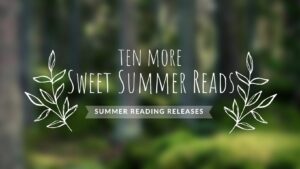I like making big claims, especially when I think I can back them up. Call it hubris. But I’m going to make a BIG claim that I think there are three goals ALL writers should adopt in the New Year.
Let’s admit it. 2020 has been a trash year. So with vaccines a’coming, let’s aim for 2021 to be a fresh start in more ways than one. And with that- onto GOALS!
Goal #1: Read
This seems self-explanatory, but I can’t tell you the number of times I’ve seen writers aiming to be published who claim they NEVER read.
If I don’t read, how do I know what good writing sounds/looks like? How do I know what the tropes are of your genre? How do I even know how to shape basic plot and character structure?
Recently, I’ve gotten into writing horror short stories and my challenge for the New Year is to either subscribe to some horror/suspense magazines or pick up a couple of anthologies so I can learn the basics. I also want to read at least three books on writing craft this year (as opposed to the one I completed this past year.) Craft books enable me to skim other writer’s toolkits and see if there is something useful there for me. It helps me think in a more structured manner about the stories I want to tell- which actually fuels creativity because I feel less overwhelmed. It’s like approaching mountain climbing with a full toolbelt instead of bare hands.
Even if you don’t read widely, at least challenge yourself to begin reading books on writing craft as well as leaders within your genre. This alone will make your writing grow by leaps and bounds.
Goal #2: Plan
This goal might seem a little less obvious and how you plan might vary based on your needs. Did you struggle to get words on the page this past year? Take a minute to think about why.
Were you overwhelmed with everything happening in the world? Did you always run out of time? When you sat down to write, did you not know what to say?
If you were overwhelmed, maybe you need to create a self-care plan. Are there friends you can reach out to who make you feel calmer? If you have the budget, could you talk to a therapist about ways to manage your stress? Maybe it’s time to get the TV out of the bedroom, set up a phone-charging station in another room of the house, or adopt a gentle exercise routine. Self-care can look like many different things and doesn’t have to be a huge lifestyle change.
If you are always running out of time, look for the little snippets you can use. Do you have commute you can use? When I’m stuck in the car, I sometimes use the dictation function in my phone’s notes app to get some writing done. When finishing The Gravedigger’s Guild, I set an appointment with myself every night that I couldn’t turn on Netflix until I had written for 30 minutes. (It’s amazing what you can get done in a concentrated 30 minutes!)
Maybe that’s 15 minutes for you and it’s on your lunch break, or while you have coffee in the morning. Or while waiting at the doctor’s office. Or waiting to pick up groceries. There are many small pockets of time that we can use well if we have a plan for them. And that leads to…
If you spend most of your “writing time” as “staring into space figuring out what to say time,” then maybe you need to go old-school and develop a writing plan. As in outlining.
I’ve actually gotten to a point where I enjoy the outlining stage as much as the writing stage. *gasps* It’s true though. During this stage I can get in touch with my characters, figure out major plot points (based on my characters), and eliminate some of the worst problems before I ever start. With plotting, I do it to the level of detail that fits my project. Maybe I just want one or two lines per scene. Maybe I take a couple of paragraphs to describe each scene so I have my characters’ motivations, setting, and perhaps even jots of dialogue ready to go when I get there.
The secret about plotting is that it shows me where to go but not how I’m getting there, so I still have plenty of fun writing along the way. BUT when I sit down to write I’m not lost on what I’m doing. I read the last scene I’ve written (or outlined) and launch into the next because I’ve already laid out my road.
Can you tell I’m a big advocate of planning? 😉
Goal #3: Audience
Ok, so maybe this goal isn’t for every writer. If you’re writing just for yourself or only friends and family, you don’t really have to worry about finding your audience.
For everyone else, though, you’re going to need to find your audience. And they don’t magically appear if you don’t put in the work.
You’ll need to learn some marketing basics. That’s just the truth.
Now, by marketing I don’t mean sleazy sales pitches. Bleh.
Marketing is about building relationships with people who are already interested in the kinds of things you write.
So instead of thinking about “Buy my book” strategies, think about just getting your book in front of people already looking for it.
Do you write YA fantasy? Then make sure when you upload your books to Amazon, B&N and other retailers that you select the correct categories and keywords, that you have a professionally designed cover, that your description is well-written and formatted, and that you have some advanced reader reviews quoted if possible. This is the bare minimum. It takes some copywriting practice and research but it is worth it.
Want to go beyond? Research which platform your audience is on (there are tons of articles on this) and then have some fun with social media! The key here is fun. You are talking WITH people, not selling to them. For some more in-depth, no-nonsense advice on this, I recommend the folks from the Mixtus Media, who write just for authors.


